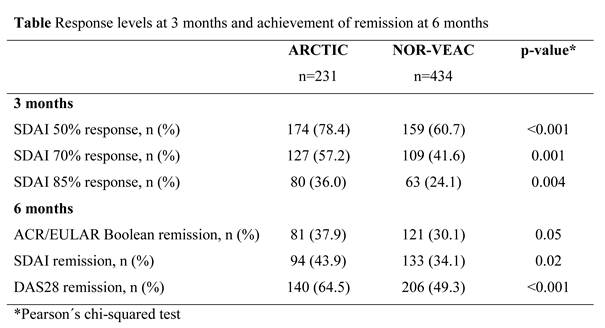Session Information
Date: Wednesday, October 24, 2018
Title: 6W023 ACR Abstract: RA–DX, Manifestations, & Outcomes VI: Outcomes Reports (2982–2987)
Session Type: ACR Concurrent Abstract Session
Session Time: 11:00AM-12:30PM
Background/Purpose: Treat-to-target (T2T) has become a key element in the management of rheumatoid arthritis (RA). Several different measures exist to define the preferred treatment target of remission. The objective of the present study was to compare treatment response and achievement of remission during the first 6 months after initiating first disease modifying anti-rheumatic drug (DMARD) therapy in two early RA-cohorts applying different T2T strategies.
Methods: We included 231 patients from the ARCTIC trial (inclusion period 2010-2013) and 434 patients from the observational NOR-VEAC study (inclusion period 2010-2016). Both studies applied a T2T strategy. In ARCTIC the treatment target was deep remission defined as Disease Activity Score (DAS) <1.6 with no swollen joints (44 joints), and in half the patients, in addition no power-Doppler ultrasound activity. Patients were followed with visits at 1, 2, 3, 4 and 6 months and a fixed T2T escalation protocol. In NOR-VEAC the treatment target was sustained DAS28 remission (<2.6) and treatment was guided by current EULAR treatment recommendations for RA. All patients attended visits at 3 and 6 months, and extra monthly visits could be scheduled if needed. In the present study, included patients fulfilled the 2010 ACR/EULAR criteria for RA, were DMARD-naïve and started treatment with methotrexate (MTX). We used the Simplified Disease Activity Index (SDAI) 50/70/85% response criteria to assess improvement in disease activity from baseline to 3 months. Pearson´s chi-squared test was used to compare achievement of SDAI response at 3 months and proportions in remission according to the ACR/EULAR Boolean-criteria, SDAI (≤3.3) and DAS28 at 6 months.
Results: At inclusion patients in ARCTIC were significantly younger, had higher disease activity and more were ACPA positive than in NOR-VEAC (age (SD) 51.5 (13.7) vs. 54.4 (13.7) years, p=0.01; SDAI 24.9 (13.1) vs. 21.0 (14.2), p<0.001; ACPA positivity 82% vs. 69%, p<0.001). The median baseline dose of MTX was similar in the two cohorts (15 mg), however at 3 and 6 months the median dose was higher in ARCTIC. More patients in NOR-VEAC had changed DMARD regimen at 3 months (9.2% vs. 0.9%, p<0.001) and 6 months (21.3% vs. 19.2%, p=0.04). At 3 months, SDAI improvement levels were significantly higher in ARCTIC than in NOR-VEAC (table). Median (25-75% percentile) time to first SDAI remission was 3.0 (1.2-8.1) months in ARCTIC and 6.4 (3.4-12.1) in NOR-VEAC (p<0.001). At 6 months, 38% of patients in ARCTIC vs. 30% in NOR-VEAC had reached ACR/EULAR Boolean-based remission, whereas 45% vs. 34% had reached SDAI remission.
Conclusion: In a tight control T2T cohort aiming for deep remission we observed greater improvement in disease activity the first 3 months, shorter time to first remission and a higher proportion of patients in remission according to the ACR/EULAR Boolean-criteria or SDAI at 6 months than in a real-life T2T cohort targeting DAS28 remission.
To cite this abstract in AMA style:
Norvang V, Brinkmann GH, Sexton J, Aga AB, Lillegraven S, Uhlig T, Kvien T, Mjaavatten MD, Haavardsholm EA. Achievement of Remission in Two Early Rheumatoid Arthritis Inception Cohorts Implementing Different Treat-to-Target Strategies [abstract]. Arthritis Rheumatol. 2018; 70 (suppl 9). https://acrabstracts.org/abstract/achievement-of-remission-in-two-early-rheumatoid-arthritis-inception-cohorts-implementing-different-treat-to-target-strategies/. Accessed .« Back to 2018 ACR/ARHP Annual Meeting
ACR Meeting Abstracts - https://acrabstracts.org/abstract/achievement-of-remission-in-two-early-rheumatoid-arthritis-inception-cohorts-implementing-different-treat-to-target-strategies/

